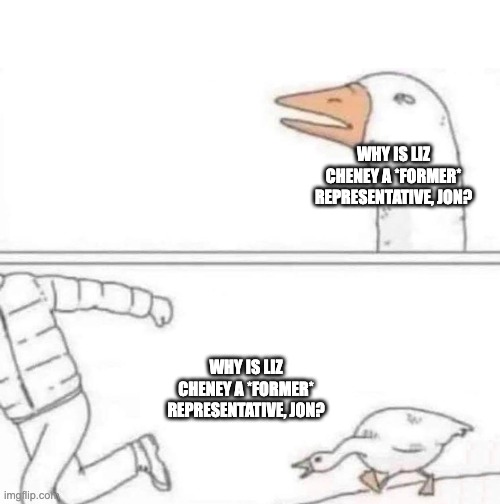Jonathan Turley Wants Everyone To Chill Out And Just Trust The Guy Who Speaks Fondly Of Hitler
Jonathan Turley says the darnedest things.

(Photo by Bonnie Cash-Pool/Getty Images)
Law professor Jonathan Turley thinks it’s silly to suggest that Donald Trump would embrace authoritarianism in a hypothetical second term. Turley arrived at this conclusion despite warnings from Trump’s former cabinet secretaries, the Supreme Court’s newfound absolute executive immunity stance, the assurances of Trump’s second-term hopefuls, and TRUMP’S OWN WORDS.
Turley reminds his audience that he actually knows better than all those particularly damning vectors of evidence because those people get in the way of Jonathan Turley’s gravy train: appearing on TV to tell Trump-skeptical Republicans not to worry.
Law Firm Business Development Is More Than Relationship Building
So instead, he’s just going to ignore all that testimony and pretend it’s just something AOC and the hosts of The View talk about. Besides, even if Trump were interested in autocracy, some serious moderate would probably stop him somewhere along the line, right?
All that is required is for over two centuries of constitutional order to fail suddenly, and for virtually every constitutional actor in our system to suddenly embrace tyranny.
Those pushing this hysteria often curiously cite the January 6 riot as proof that the end is near. Yet that horrible day was the vindication, not the expiration, of our constitutional system. The system worked. The riot was put down. Congress, including Republicans, reassembled and certified Biden as the next president.
In the courts, many Trump-appointed judges ruled against challenges to the election.
Our system was put through a Cat 5 stress test and did not even sway for a moment.
The Supreme Court just explicitly rejected the idea that it’s illegal for a president could assassinate a political rival as long as it’s justified as an “official” security act. The election was so laughably NOT close that even most Republican judges didn’t want to stick their neck out over it. And January 6 was not a Cat 5 stress test the way 2024 could be with election officials who’ve made denialism part of their pitch. If a bunch of flag-draped tourists managed to steal a few lecterns without tanking democracy, why would election-denying state officials even try, right?
And how was it a stress test if it was all an Antifa hoax? How do these people keep their conspiracies straight?
Sponsored
Law Firm Business Development Is More Than Relationship Building

Curbing Client And Talent Loss With Productivity Tech

Thomson Reuters' Claims Explorer: A Powerful Tool For Legal Claim Identification


Curbing Client And Talent Loss With Productivity Tech
Former Rep. Liz Cheney (R-Wyo.) has declared with authority that either you vote for Harris, or this “may well be the last real vote you ever get to cast.”
 As for his reminder that when he says “Congress, including Republicans, reassembled and certified Biden as the next president,” those plucky side characters all got purged the next time they faced voters. They’ve been sent home from their big city jobs and are probably opening a book store in their home town and reconnecting with their small town crushes just in time for Hallmark holiday season.
As for his reminder that when he says “Congress, including Republicans, reassembled and certified Biden as the next president,” those plucky side characters all got purged the next time they faced voters. They’ve been sent home from their big city jobs and are probably opening a book store in their home town and reconnecting with their small town crushes just in time for Hallmark holiday season.
Just kidding, they’re oil lobbyists.
Others, like running mate JD Vance, have spent the intervening years coming around to the position that Trump didn’t lose that they would’ve never taken at the time.
Which is before we even consider this sophomoric argument in its proper context: even if you think the Trump judiciary and congressional Republicans would hold up in the face of an authoritarian power grab, WHY WOULD YOU EVEN WANT TO TEST THAT?
Sponsored

Tackling Deposition Anxiety: How AI Is Changing The Way Lawyers Do Depositions

Luxury, Lies, And A $10 Million Embezzlement
It’s almost impossible to imagine a serious account of this subject without even acknowledging any of this. And, in fact, Turley’s article is deeply unserious.
But he kept with it to close out the week, glossing over concerns about election officials that ran on denialism claims with triumphal follow up today, crowing that no one should worry about voter suppression measures because they’re… popular!
Democratic candidates, including Vice President Harris, have denounced voter identification laws as “Jim Crow 2.0” attacks on voters. A majority of voters have long supported these laws. According to a new Gallup poll, that majority is now a supermajority.
It’s unintentionally fitting that Turley brushes off the substantive risk that these laws revive the legacy of Jim Crow with “most people support it.” In 1966, a supermajority of Americans had an unfavorable view of Martin Luther King Jr. too so maybe our take on the merits of civil rights abuses shouldn’t be decided by opinion polls. Then again, Jonathan Turley had no idea that MLK was ever arrested for protesting segregation so his grasp of constitutional history might be a little shaky.
Adding voter ID hurdles, either at the polls or at registration, are almost always popular because they sound superficially reasonable. While voter fraud cases are extraordinarily rare, too sporadic to actually influence any significant election, and almost always the result of a legal misunderstanding or people trying to vote twice (examples of illegal voting that identification laws aren’t even needed to stop) the drumbeat for these new laws to “protect” elections have sounded for years.
Why do these calls come exclusively from the same side of the aisle that wanted to hang Mike Pence for not unilaterally tossing votes? Well, because the Republican Party, exclusively, has decided that voter ID laws are a surprise tool that will help them later.
There’s nothing per se wrong with voter identification. The right to vote should not be contingent on having a car or an interest in air travel so there would have to be a widespread method of identification besides a driver’s license or passport. And until the Supreme Court decides otherwise, the Constitution doesn’t countenance a poll tax, so access to these IDs would have to be free and not gatekept beyond artificial obstacles like closing all the DMVs in majority Black areas of the state (a move that one state pulled and then reversed under widespread scrutiny).
But that’s the rub, isn’t it? The issue, as someone cosplaying as a constitutional scholar should know, is that the country has a long history of voter suppression behind superficially neutral mechanisms. Turley should, theoretically, be aware of the legacy of voter literacy tests, justified as a means to ensure an informed electorate but written with vague questions allowing the administrator to pass or fail voters based on race. Surely, Turley (heh) wouldn’t rubberstamp a new round of literacy tests based on the general public’s saying they want educated voters.
Or maybe he would… I guess we don’t know how far he’ll bend to get invited on cable news at this point.
The complaint around voter ID laws is that the general public fails to understand that the introduction of “popular” voting requirements rarely get deployed without serious shenanigans. Anyone who’s tried to walk into a bar between the ages of 21-25 knows how ID laws work. Someone is going to look at it and decide — based mostly on vibes — if you look enough like the picture on that card to be legal. Some patrons will draw little to no scrutiny while others will get a thorough once over. The problem with voter ID is not the idea of voters merely having an ID, it’s the prospect of a random poll worker who fervently believes Venezuelan space lasers controlled the last election scanning everyone walking into the room and deciding that an elderly Black guy or a soccer mom with the Notorious RBG Stanley cup just don’t look enough like their pictures!
Bringing us back to Turley’s comical claim to being a “constitutional” expert. The reason we have a Constitution is to guard against popular, ill-thought out ideas by recognizing the risk they pose in greasing the wheels of the tyranny of the majority. A constitutional scholar would approach popular policies with a skeptical eye — especially when it comes to voting laws, a subject that’s given rise to amendments, multiple statutory fixes, and a litany of court challenges.
You know… all those times that the Constitution faced actual Cat 5 stress tests.
Even if a serious law professor ultimately saw the benefits of voter ID laws as a tailored cure to largely nonexistent false identity voter fraud outweighing the risks, they would have to make a case for WHY they dispense with these historically supported concerns such that a detractor could honestly engage that claim on the merits.
But Turley is not a serious man.
 Joe Patrice is a senior editor at Above the Law and co-host of Thinking Like A Lawyer. Feel free to email any tips, questions, or comments. Follow him on Twitter or Bluesky if you’re interested in law, politics, and a healthy dose of college sports news. Joe also serves as a Managing Director at RPN Executive Search.
Joe Patrice is a senior editor at Above the Law and co-host of Thinking Like A Lawyer. Feel free to email any tips, questions, or comments. Follow him on Twitter or Bluesky if you’re interested in law, politics, and a healthy dose of college sports news. Joe also serves as a Managing Director at RPN Executive Search.







